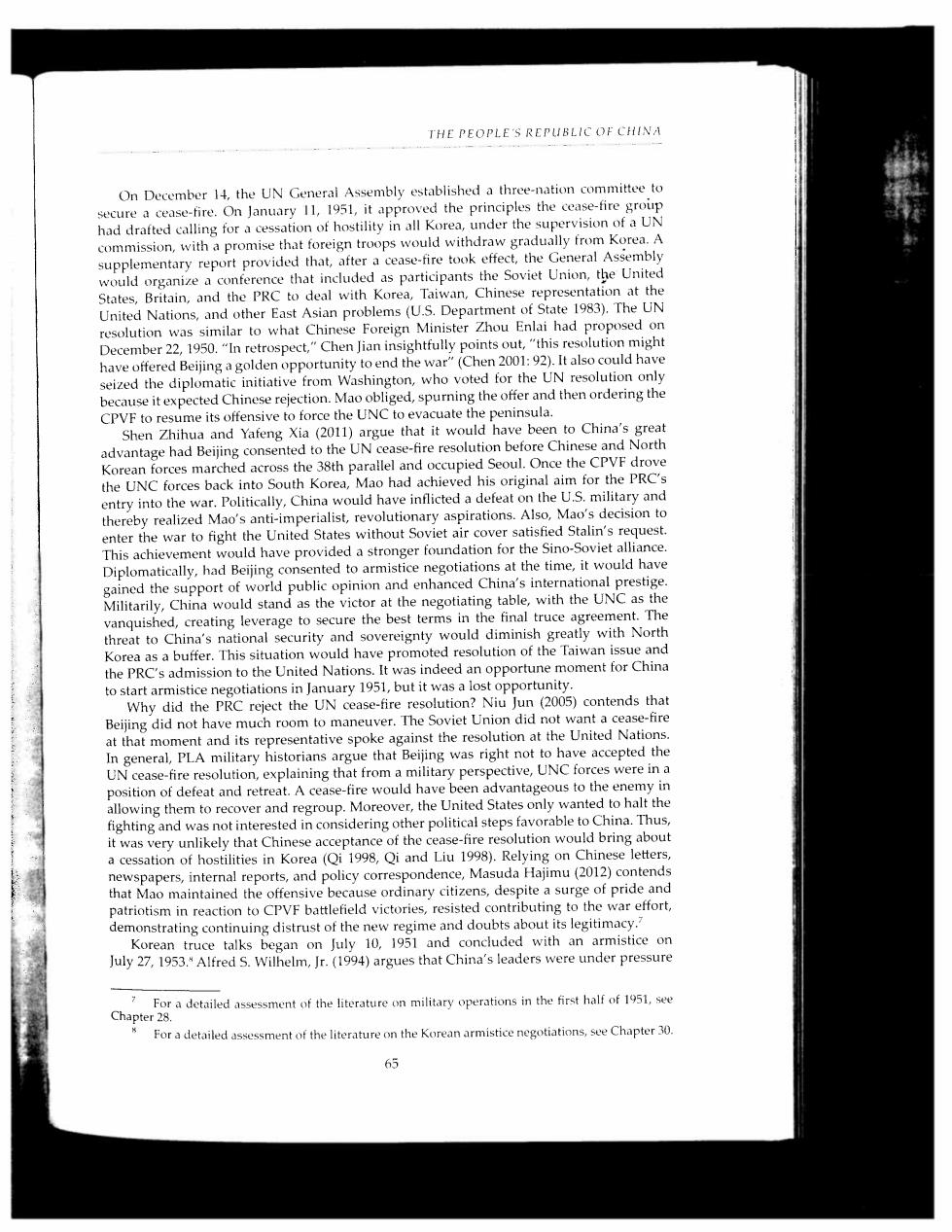正在加载图片...

THE PEOPLE'S REPUBLIC OF CHINA On December 14,the UN General Assembly established a three-nation committee to secure a cease-fire.On January 11,1951,it approved the principles the cease-fire group had drafted calling for a cessation of hostility in all Korea,under the supervision of a UN commission,with a promise that foreign troops would withdraw gradually from Korea.A supplementary report provided that,after a cease-fire took effect,the General Assembly would organize a conference that included as participants the Soviet Union,the United States,Britain,and the PRC to deal with Korea,Taiwan,Chinese representation at the United Nations,and other East Asian problems(U.S.Department of State 1983).The UN resolution was similar to what Chinese Foreign Minister Zhou Enlai had proposed on December 22,1950."In retrospect,"Chen Jian insightfully points out,"this resolution might have offered Beijing a golden opportunity to end the war"(Chen 2001:92).It also could have seized the diplomatic initiative from Washington,who voted for the UN resolution only because it expected Chinese rejection.Mao obliged,spurning the offer and then ordering the CPVF to resume its offensive to force the UNC to evacuate the peninsula. Shen Zhihua and Yafeng Xia(2011)argue that it would have been to China's great advantage had Beijing consented to the UN cease-fire resolution before Chinese and North Korean forces marched across the 38th parallel and occupied Seoul.Once the CPVF drove the UNC forces back into South Korea,Mao had achieved his original aim for the PRC's entry into the war.Politically,China would have inflicted a defeat on the U.S.military and thereby realized Mao's anti-imperialist,revolutionary aspirations.Also,Mao's decision to enter the war to fight the United States without Soviet air cover satisfied Stalin's request. This achievement would have provided a stronger foundation for the Sino-Soviet alliance. Diplomatically,had Beijing consented to armistice negotiations at the time,it would have gained the support of world public opinion and enhanced China's international prestige. Militarily,China would stand as the victor at the negotiating table,with the UNC as the vanquished,creating leverage to secure the best terms in the final truce agreement.The threat to China's national security and sovereignty would diminish greatly with North Korea as a buffer.This situation would have promoted resolution of the Taiwan issue and the PRC's admission to the United Nations.It was indeed an opportune moment for China to start armistice negotiations in January 1951,but it was a lost opportunity Why did the PRC reject the UN cease-fire resolution?Niu Jun(2005)contends that Beijing did not have much room to maneuver.The Soviet Union did not want a cease-fire at that moment and its representative spoke against the resolution at the United Nations. In general,PLA military historians argue that Beijing was right not to have accepted the UN cease-fire resolution,explaining that from a military perspective,UNC forces were in a position of defeat and retreat.A cease-fire would have been advantageous to the enemy in allowing them to recover and regroup.Moreover,the United States only wanted to halt the fighting and was not interested in considering other political steps favorable to China.Thus, it was very unlikely that Chinese acceptance of the cease-fire resolution would bring about a cessation of hostilities in Korea(Qi 1998,Qi and Liu 1998).Relying on Chinese letters, newspapers,internal reports,and policy correspondence,Masuda Hajimu(2012)contends that Mao maintained the offensive because ordinary citizens,despite a surge of pride and patriotism in reaction to CPVF battlefield victories,resisted contributing to the war effort, demonstrating continuing distrust of the new regime and doubts about its legitimacy.? Korean truce talks began on July 10,1951 and concluded with an armistice on July 27,1953."Alfred S.Wilhelm,Jr.(1994)argues that China's leaders were under pressure For a detailed assessment of the literature on military operations in the first half of 1951,see Chapter 28. For a detailed assessment of the literature on the Korean armistice negotiations,see Chapter 30. 65